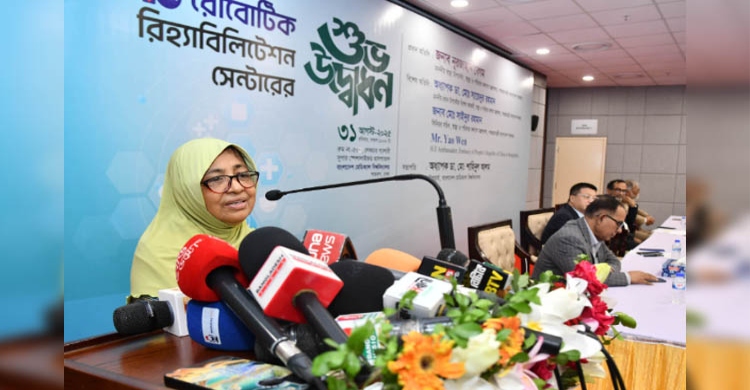Nurjahan opens country's first robotic rehabilitation centre at BMU


Health Adviser Nurjahan Begum today inaugurated the country's first robotic rehabilitation centre, established at the Super Specialized Hospital of Bangladesh Medical University (BMU) in Shahbagh here, marking a new era in the rehabilitation of patients with paralysis and long-term neurological conditions.
The centre has been set up with a grant from the Chinese government, which authorities regard as a significant contribution to Bangladesh's healthcare sector.
Chief Adviser's Special Assistant Professor Dr Md Sayedur Rahman, Chinese Ambassador to Bangladesh Yao Wen and Health Services division secretary Md Saidur Rahman were present as special guests.
BMU Vice Chancellor Professor Dr Shahinul Alam presided over the event.
Nurjahan Begum said, "The Chinese government extended support upon our request. Now the challenge is to make this centre sustainable," she said, urging BMU authorities to expand such services to at least three or four districts.
A pilot project at the centre began on a limited scale on July 10. Built with technical support from China, the facility meets international standards and offers advanced, technology-driven rehabilitation services.
According to sources, the Chinese government provided robotic equipment worth nearly Taka 20 crore for the project. With 62 robots-22 of them AI-based-the centre will offer precise physiotherapy, neurological rehabilitation, and long-term treatment tailored to each patient's condition.
As part of the preparatory phase, seven biomedical engineers from China have trained 27 doctors and physiotherapists. Once the trained personnel gain further experience and all necessary preparations are complete, the centre will begin full-scale operations.
The facility will assist patients undergoing complex rehabilitation for stroke, paralysis, neurological disorders, chronic pain, nerve injuries, frozen shoulder, accident-related complications, or organ weakness. Those injured during the July movement and still experiencing long-term complications will receive free robotic treatment.
The centre's services are planned to gradually expand to general patients, with efforts to keep treatment costs affordable. Authorities say the facility represents not only a technological leap for Bangladesh's healthcare system but also a beacon of hope for people living with paralysis and long-term illnesses.
